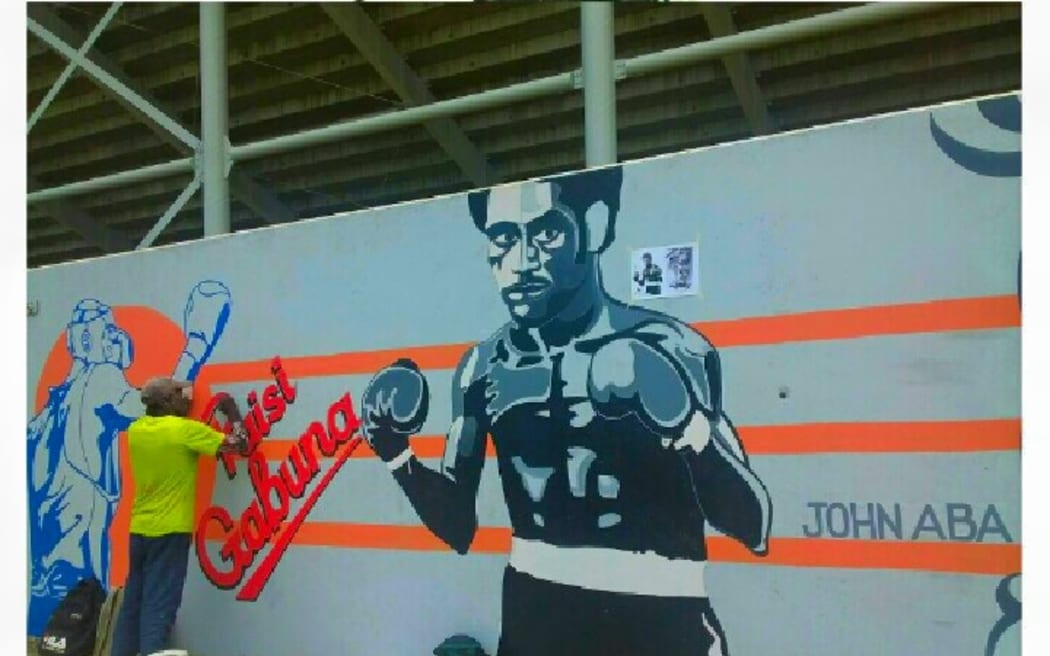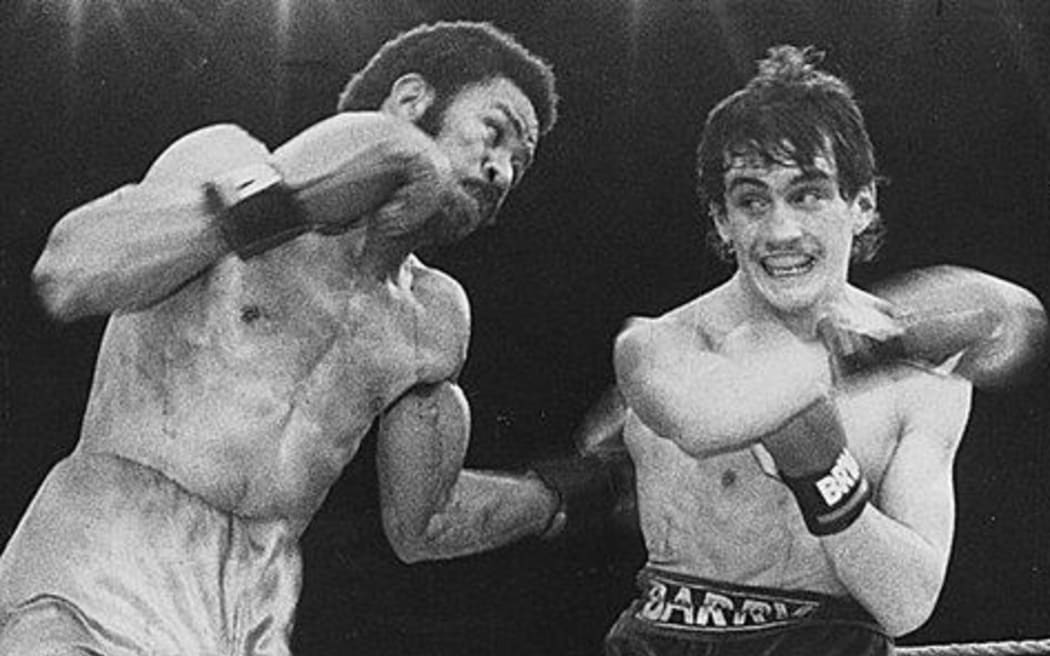
An artist keeps alive the memory of Johnny Aba with this artwork at the Sir Hubert Murray Stadium gate walls in Port Moresby in 2019. Photo: Supplied
As plans progress to bring boxing legends Manny Pacquiao and Anthony Mundine to Port Moresby for a "Vegas night" style exhibition, the potential extravaganza has ignited memories of Papua New Guinea's greatest night of boxing - and one of the most controversial.
On the evening of November 17, 1979, at the Sir Hubert Murray Stadium, the local favourite and Commonwealth super-featherweight champion Johnny Aba was up against Eusebio Pedroza, who was putting his WBA featherweight title on the line. It was the first genuine world title fight to be held in PNG.
The record books tell us this: Pedroza stopped the challenger in the 11th round. But the reality is somewhat different with Pedroza's tactics unorthodox at times to say the least and the end highly controversial with the contender left injured. Pedroza threw Aba out of the ring; the Papua New Guinean hit his head on the apron of the external ring and was unable to continue. Yet, instead of being disqualified, the Panamanian's hand was held up as the victor by technical knockout (TKO).
Pedroza was ahead on points at the time but with four rounds remaining anything was still possible.
Route to the title fight
Eusebio Pedroza held an unremarkable record when he challenged Spain's WBA champion Cecilio Lastra in April 1978 in Panama City. Pedroza won in the 13th round and defended the belt five times over the next 18 months, at a time when there were 'only' two world champions unlike the four or even more who hold a claim to a title belt these days. His most impressive result was just four months before, a 12th-round TKO of the legendary multi-time world champion Mexican Ruben Olivares.

Eusebio Pedroza fighting Barry McGuigan in Belfast in 1985. Photo: Archive
Aba, meanwhile, was an unknown quality outside PNG and wasn't ranked in the Ring Magazine's annual ratings at his weight division. But he was national and Commonwealth champion with a string of wins over predominantly decent Australians.
Aba, who hailed from Roravana on Bougainville island, turned professional in 1976, a month after his 20th birthday with a bout against tough Australian Alan Hilt who knew about being hit - he'd had 32 fights and lost almost all of them. But he always lasted the distance and did that over 10 rounds against Aba.
Over the next three years, Aba built up an impressive 27-1-1 record, fighting almost exclusively in his home country. Many of his opponents were journeymen, but several were the best the region had to offer.
He won both the national featherweight and lightweight titles and in December 1977 outpointed top-class Aussie southpaw Billy Moeller over 15 rounds for the Commonwealth super-featherweight title. Moeller was no slouch and among his wins was a title defence victory over future world champion Barry Michael.
Aba defended the Commonwealth title against yet another good Aussie, Brian Roberts, with a 12th-round TKO, Moeller again, and Fiji's Willie Tarika, also on points. That was just a month out from the title fight against Pedroza, who had the luxury of four months to prepare.
Scales and fitness levels
Aba was a massive underdog in by far the biggest fight of his short career. He had to slim down to the featherweight limit of 126lb and did so with a quarter of a pound to spare. The Panamanian was bang on the scales but had to lose a pound on the day of the fight to do so. The weigh-in was delayed by an hour so Pedroza could make weight.
The undercard featured local fighter Tiger Mann making his pro debut and another Papua New Guinean, Mark Apai. Mann settled for a draw but Apia won on points. With all three fights going the distance, the main event didn't begin until 11pm, when the temperatures had dipped, and a cool breeze engulfed the stadium.
Back in the 70s, there were no ludicrous walk-ins to the ring or syllable-expanding introductions of the fighters by the MC which could have delayed the fight even longer.
Any fears among those ringside about the quality of the fight were soon dispelled as Aba looked strong and unafraid to mix it with Pedroza. Norm Salter, his trainer and manager, said beforehand that his fighter had never been fitter and could go 20 rounds.
After an opening round in which the fighters sized each other up, there was more action in the second and Pedroza showed he was a bit of a showman with some dancing and prancing and an Ali shuffle. In the third Aba connects with a cracking right but Pedroza is unperturbed.
In the middle rounds, Pedroza begins to take control and in the 5th hammers Aba. In the 6th he has his foe in trouble with a barrage of punches. Aba survives and the pair slug it out in the 7th which is Aba's best round since the early exchanges, eliciting chants of 'Aba Aba' from the partisan crowd.
The 10th round is all Pedroza's as he lashes at Aba for the final minute. There's a delay for the 11th round as water splashed on Pedroza to cool him down must be mopped up. Going into the round Australian commentator Alf Shaw has it 97-95 to the champion; there is all to fight for.
However, Pedroza pushes Aba out of the ring with his left arm, sending Aba flying and hitting his head. There are a few concerning minutes as the doctor inspects him, but he rises to his feet. Referee Stanley Christodoulou raises Pedroza's hand; the crowd as you might expect are unhappy but accept the decision. The noble art clearly didn't apply to the champion who had also been warned by the man in the middle about low blows several times during the contest.
While the ringside commentator had it close with two points separating them at the end of the 10th, the referee and two judges had Pedroza further ahead, by between four and seven points. Aba would have required a knock-out to win. But it was a courageous display against a worthy and formidable opponent who wasn't overwhelmed by Pedroza's reputation and fought with plenty of heart and courage.
After the Pedroza fight, Aba continued boxing for nearly three years, defending his Commonwealth title against Willie Tarika, Billy Moeller - a draw - and a points win over Australia's Gary Williams. That fight, at the Sir Hubert Murray Stadium in Port Moresby which Aba had come to know so well, was his last.
He even fought in Las Vegas in 1981 winning one bout before losing to Refugio Rojas who went on to fight for the WBC super-featherweight title.
Aba retired after six years in the sport with a record of 31 wins, three defeats, and three draws. Pedroza on the other hand defended his title 12 more times over the next six years before being deposed by Ireland's Barry McGuigan.

